You are currently browsing Fabro Steibel’s articles.
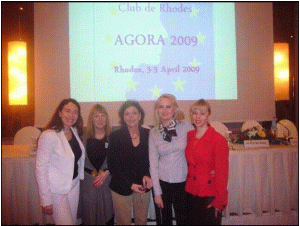
Participants, all of whom were winners of the prestigious national awards, came from across Europe to discuss contemporary challenges and to provide input into policy deliberations on future EU priorities with politicians, journalists, financiers and regional government representatives.
As the only ever British person to be awarded the accolade of International Woman of Europe, Prof Juliet Lodge was invited by the Vice President of the European Parliament, Rodi Kratsa and President of the Agora, to address the closing plenary of the Agora in Rhodes about the future of women in Europe i2020.
Drawing on her research on EU freedom, security and justice, egovernance and ethical information and communication technologies, she addressed the role of women in sustaining EU values and communicating and shaping a new image of Europe domestically and abroad by mobilising cultural capacity.
Other speakers included: the First Lady of Georgia, Sandra Roelofs; the former Foreign Minister of Austria, Ursula Plassnik; Vaira Vike-Freiberga, former President of the Republic of Latvia; and Fausta La Valle Deshormes, honorary director of the EU Commission.
Participants, all of whom were winners of the prestigious national awards, came from across Europe to discuss contemporary challenges and to provide input into policy deliberations on future EU priorities with politicians, journalists, financiers and regional government representatives.

Containing more than 120 portrait photos and 135 scenic impressions, “Crossroad Europe” takes its readers along on a journey through all 27 EU member states.
Is Europe boring? Not if you are interested in people! Dutch photographer Bruno van den Elshout dedicated one year to travelling around the European Union to meet people from all 27 EU-countries. Throughout his journey, Van den Elshout spoke to more than 2500 young Europeans about their daily lives. The book “Crossroad Europe” summarises his impressions.
Containing more than 120 portrait photos and 135 scenic impressions, “Crossroad Europe” takes its readers along on a journey through all 27 EU member states. Whilst en route, readers are being introduced to more than 500 young Europeans, who tell about their countries, customs, worries and expectations for the future. “Crossroad Europe” serves as an inspiring starting point for explorations into Europe’s marvellous cultural diversity. For more: www.crossroad-europe.com and www.photologix.nl.
Bruno van den Elshout has been working as an independent photographer and journalist since 1999. During recent years, he expanded his work terrain to gradually make it encompass the entire European Union. Exhibitions previously prepared by Van den Elshout include “The face of Europe”, “Passport, please!”and “La vida local”. His work is best described as realistic and authentic, while daily life serves as a continuous source of guidance and inspiration.
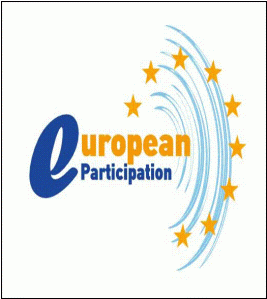
unlikely to foster mass democracy. Instead we suggest there is a demand for a deliberative participatory form of democracy, in which the scope for eParticipation could be enhanced in two ways: making the “strong publics” of policy networks more accessible to new participants; and encouraging and protecting independent or oppositional public enclaves where alternative discourses can emerge and develop.
Text by Simon Smith, Research Associate, Institute of Communications Studies. Simon works on the European eParticipation study with ICS Professor of Digital Governance Ann Macintosh and other partners in Denmark and Greece, funded by the European Commission. His research interests cut across geography, sociology, political science and communication studies:
The European eParticipation Study is being implemented on behalf of the European Commission DG Information Society and Media by a consortium of the Danish Technological Institute (DK), Leeds University (UK) and the University of Macedonia (GR). The purpose is to provide a synoptic view of where Europe currently stands regarding eParticipation. It is due to complete in June 2009.
Our specific objectives are:
– To identify the legitimate and appropriate roles of eParticipation at European level and the barriers to adoption.
– To map the state of play of eParticipation in the EU and Member States (where this has European relevance).
– To support dialogue and networking on eParticipation between the European Commission and key stakeholders at local, regional, national and EU level.
– To explore the scope for broader diffusion of eParticipation in the EU, via demonstration of good practices and ways of adopting them.
– To make recommendations for EU level actions in the field of eParticipation.
For the purposes of this study, eParticipation is defined as participation using ICT, either alone or alongside non-ICT channels, where participation relates mainly to inputs to policy- and decision-making for political or public policy purposes, both within formal systems but also through informal systems where these can have a real impact at any stage of the policy lifecycle.
We hold periodic workshops, where we invite feedback and comments on our findings from various stakeholders (decision-makers, practitioners, other researchers). We have also used online networks and events to encourage feedback. For instance, we moderate the eParticipation and eDemocracy network that exists on the EU’s ePractice website (see http://www.epractice.eu/community/eParticipation).
So far, we have produced two intermediate iterations of all our deliverables, which you can download at: http://www.european-eparticipation.eu/index.php?option=com_docman&task =cat_view&gid=36&dir=DESC&order=name &Itemid=82&limit=15&limitstart=0
We are currently preparing our final reports and recommendations for publication at the end of June or early July.
In the scope of our conceptual work, we have developed an analytical framework for evaluating eParticipation. It uses an impact assessment framework similar to that used by the EC, distinguishing between different levels of goals – outputs, outcomes and impacts – which eParticipation might contribute towards.
We have analysed the benefits of participation and eParticipation, with reference to democratic norms associated with specific governance regimes. The EU governance regime is unlikely to foster mass democracy. Instead we suggest there is a demand for a deliberative participatory form of democracy, in which the scope for eParticipation could be enhanced in two ways: making the “strong publics” of policy networks more accessible to new participants; and encouraging and protecting independent or oppositional public enclaves where alternative discourses can emerge and develop.
Drawing on the analytical framework, we have developed and applied a framework for evaluating specific initiatives, for the purpose of identifying good practice. The proposed framework utilises eight evaluation criteria: results and achievements, societal impact, innovation, lessons learnt, sustainability, transferability, visibility and functionality. A questionnaire was developed as the instrument for applying it, which is compatible with, but can also improve on the framework used on ePractice.eu to classify cases, since the latter is not eParticipation-specific.
A major output of the study is the identification, collection and reporting of eParticipation cases from around Europe. We have collected 273 cases, though only 24% of these operate at European, trans-national or international level, since the local, regional and national scales are dominant in the eParticipation field.
Pending a full analysis of the results of the questionnaire survey of practitioners, our desktop survey work already indicates that, for example:
– the European Commission and the European Parliament are the most active EU institutions in implementing eParticipation initiatives
– political parties and civil society do not harness the benefits of eParticipation to the extent one might expect, given their important role in the public sphere the mass media play an important role in facilitating eParticipation
there are lessons from the private sector, where processes like innovation jams could be a basis for new means to enhance mass citizen participation.
Our recommendations are therefore in a preliminary stage, but one thing we will be stressing is the need for both development and evaluation/research that take a long-term perspective, because eParticipation has progressed beyond the experimental stage and above all needs embedding as a regular part of social and political life.
You can read the first peer-reviewed outputs of the study in the latest edition of the European Journal of ePractice:
“Contextualising Public (e)Participation in the Governance of the European Union” http://www.epracticejournal. eu/document/5509
“eParticipation initiatives: How is Europe progressing?” http://www.epracticejournal. eu/document/5510
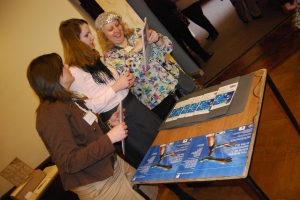
The Making Europe work for Women event was opened by the Lord Mayor of Hull, Councillor Elaine Garland. After an introduction by Pauline Westrop, from Ellerker Consulting about the vitality of young entrepreneurs in Yorkshire, Dominika Futyma, from the Polish Advice Bureau, presented her business venture.
Report on the event “Making Europe Work for Women”, Friday, 6th March 2009, Venue: Mortimer Suite, Hull City Hall.
Text by: Nathalie Henry, PhD candidate; Heidrun Herzogenrath-Amelung, MA student; Pinelopi Troullinou, MA student; Francisco Seoane Perez, journalist, PhD candidate.
Still the great unheard?
Recent news suggests that a greater proportion of women are losing their jobs than men in the current downturn, and that when it comes to getting their needs addressed and their potential for innovation harnessed, they are too often unheard. Discussing how the opportunities opened up by the European Union can be harnessed by the entrepreneurial women in the Yorkshire and Humberside region was the goal of a conference held in Hull on 6 March 2009. This event was organised by the Yorkshire Women Entrepreneurs in association with the Jean Monnet European Centre of Excellence at the University of Leeds as part of the programme of events to heighten awareness of the Euro elections 09, and awareness building and cooperation with the public on core European issues.
A further aim of this one-day conference in Hull was to listen to, discuss and reflect on women’s perceptions of Europe and what they feel the EU might do in terms of initiatives on business support, wellbeing, mobility, and security.
Speakers included: Christian Krappitz, from the UK Representation of the European Commission in London and David Fortune, chief inspector seconded to Yorkshire Forward, on the topics of internal security, visas and cross-border crime; and on the use and abuse of the internet, how young people can be protected and how in the region, through EU initiatives people trafficking is tackled in conjunction with European counterparts and Europol. The importance of the European Arrest Warrant was highlighted.
It is was striking that this area of EU activity is not well-known among the general public even though it has immediate and direct impact in the local communities, closest to the people.
Andrew Robinson, the chairman of the French Business Council spoke about EU opportunities for doing business with partners across the EU; and Richard Corbett, MEP for Yorkshire and the Humber, on how decisions are made in the EU, the role of the European Parliament, how it works with and for citizens, and what benefits citizens enjoy as a result of EU action.
Christian Krappitz then explained a variety of EU programmes covering business, regional and local cross border cooperation opportunities, information sources and activities. Juliet Lodge pointed to the resources freely available online, including those through the JMCE and the JMECELab at the University of Leeds, libraries and websites of research programmes.
The audience indicated that they generally found the Europa websites too dense for the uninitiated. The European Movement and Europe Direct both participated at the event and distributed many brochures on the environment, EU decisionmaking and the Euro elections, opportunities for young people, education, training and business. This event was interactive. Those attending had the opportunity of interacting with fellow business women as well as discussing their needs with local and European key policy makers.
Young Entrepreneurs: Creativity and entrepreneurial spirit.
The Making Europe work for Women event was opened by the Lord Mayor of Hull, Councillor Elaine Garland. After an introduction by Pauline Westrop, from Ellerker Consulting about the vitality of young entrepreneurs in Yorkshire, Dominika Futyma, from the Polish Advice Bureau, presented her business venture.
Started four years ago, Futyma wanted to fill two gaps in the market, the lack of English/Polish translation services, and the scarce opportunities that the Polish community had to receive advice on business matters. The enterprise started from the idea of Futyma “being (her) own boss” and finding a way to work part-time as a mother. The beginnings were difficult, as there were many financial difficulties to overcome. But she persisted as she did not want “to give up the dream” and sought advice from business advice organisations. She received financial support and equipment. This enabled her to increase sale by 40 %, and her business is now well established and widely known among the Polish community. Reflecting on her own experience, Futyma encouraged future entrepreneurs to become familiar with regulations and to never lose confidence in their business.
Phil Batty, from the consultancy firm Force 7, reported how he was able to start a business just aged 16 with the support of “Young Enterprise programme”. Force 7 was set up with 12 young people as a consultancy agency. Supported by the business community the venture flourished. Batty insisted that “flexibility is key to business”. With now 3 years of experience, he expressed his thanks to “Women in Business” for helping him to be part of the business community. Indeed, the unique, in his view, flexibility and openness of local women in business made an immense difference to being able to launch business. When discussing particular barriers, Batty asked whether the EU could take steps to persuade the finance sector to be more flexible towards young entrepreneurs.
RECOMMENDATION
Action to encourage banks to assist young entrepreneurs. Batty explained that no bank would open a business account to someone aged less than 18 years old, so his firm needed support to exist. He stressed that “if Europe can do something to help, it could be to change legislation to allow young people to open a bank account before 18 years of age when running a business”. He concluded by thanking Women in Enterprise in helping him with advice and networking.
Managing Diverse Expectations: Combining family and work duties
The session dedicated to case studies of individuals and their business ventures commenced with a note of wonder: If women in the UK were to match the enterprise of their US counterparts, they could generate an additional £1.2 billion per year for the national economy.
“What’s stopping us?” was the question two women aimed to answer by relating their personal battles for success in the corporate world whilst being under pressure to meet the diverse expectations laid at their doors by society. “We struggle to juggle”, Jenny Brambles of Face to Face networking communication admitted.
Women’s roles have changed dramatically over the past decades and today it is normal for a woman to pull her weight in the workplace whilst being manager of her own life as well as that of her children, her partner and often that of elder members of the family. Caring for the elderly is still, it seems, considered to be a woman’s domain.
Justina Oraka of TJ Training’s assessment of the situation of women in Britain today, 30 years since the first UK National Women’s Liberation Conference in 1970, was equally devastating. “Nothing has changed”, she claimed, as discrimination continues to be such that participation in working life and the achieving of financial independence are rendered almost impossible. Despite the Equal Pay Act passed in 1970, women are still being paid 13% less per hour than men – this being for full-time employment, women in part-time work earn on average 41% less. The lack of childcare opportunities for working women remains, Oraka criticised, the primary obstacle for women today.
Asked about their hopes and expectations about what the European Union could do to improve their situation, there was widespread agreement amongst the delegates that support for women caring for family members, combined with better availability of and access to childcare, is the way forward. “We need to put through to Europe that old people are useful!” Ann Smith of Age Concern insisted. Engaging the elderly in childcare would benefit both the old and the young through sharing of experience, and enable women to tap their full potential.
RECOMMENDATION : Suggestion that the EU take initiatives to link up young and retired people with a view to ensuring that the older workers’ experience is readily shared with young entrepreneurs and the business leaders of the future across the range of work in the private and public sectors. Special interest in cross-border learning and sharing of experience – possibly in virtual forums.
Combating cross border crime: A local response to European issues – from a safe internet to human trafficking
Chief Inspector David Fortune and Christian Krappitz from the European Commission talked aboutcombating cross border crime. They noted that the internet can be useful for every section of our lives but many hidden dangers exist. Both of the speakers tried to answer the vital question of if there are European policies that can protect the citizens and entrepreneurs from these risks.
Christian Krappitz used a metaphor of the local Hull port that is one of the UK’s main ports to illustrate how the internet transfers information, knowledge, and opportunities. It can become a great “partner” for business through social networking. On the other hand, the risks of internet fraud must be countered.
In the last decade, much has been achieved in the field of safety. There are fewer internal borders for information exchange among EU members of the Schengen zone. The UK chose to stay out of this but still values bilateral exchanges and cooperation. Strict and secure means of transferring information are in place and under constant review. The Prüm Treaty is part of the legislative framework of the European Union and provides for Prüm Treaty member states to have mutual access to each others’ data- DNA, fingerprint and vehicle registration information systems. Europol gathers all kind of intelligence and organises systems to fight international organised crime effectively. European Union aims to protect and secure human rights.
Christian Krappitz used as an example the EU’s Fundamental Rights at the heart of Europe. In addition, he referred to significant policies that prove the importance of security. He notedthat 17 million euro are available for this purpose.He stressed that Frontex is a very promising project “to coordinate the operational cooperation between Member States in the field of border security”.
Chief Inspector David Fortune gave a presentation informed by the “Creativity & Innovation European Year 2009”. He presented the opportunities for partnership opened by the EU such as the project “2013 policing Yorkshire & Humberside” with the slogan “joint thinking, joint working.” David Fortune turned tomore practical matters. He described some past and newer EU projects – Odyssey, Pandora, Genesis – and offered guidelines on applying to participate in such schemes.
He underlined the importance of the strategic engagement in Europe and how crucialbrand and network development is. One of the projects he presented in detail concerned human trafficking, focusing on the impact on EU citizens and citizenship.The speech closed with the dictum “net-work, net-worth”
What does Europe offer? What do we need?
Dr Richard Corbett, Member of the European Parliament for Yorkshire & The Humber started his presentation with three possible answers to the question “Why do we have the EU?”. The first answer is “idealistic” and originates with post-war circumstances and aims “to find a better way”. The second is pragmatic. The third is “selfish”.
First Richard Corbett argued that ”the EU is an enormous progress in stability..it is the most successful peace story in history”. Giving a pragmatic perspective, Corbett then suggested that the EU is “a neighborhood community” and “we are all inter-dependants”. He went on developing the argument about why the EU, with its member states, has and needs “common rules”, stressing “it makes sense to have common rules for business”. He conceded that the EU is often associated with bureaucracy, but noted that the Commission’s size was no larger than a city or municipal authority’s employee base.
He noted that in terms of business in Europe, the EU acts as a facilitator to remove barriers to trade and cutting the administrative burden. He said: the EU had secured “a huge cut of bureaucracy for business”. For example a business would now only need one trademarkand set of documents when in the past, each state had its own separate sets that had to be completed when crossing borders : now there is aSAD, single administrative document, for businesses to use.
Referring to the “selfish” perspective about “why do we have EU?” Corbett reflected on many diverse aspects of British national interests. Regarding trade, he noted that“60% of (British) trade is with Europe”.He insisted that “common market means more options for the UK”.
Reflecting on EU governance, Corbett then asked the question: “Does it work well?”, answering immediately “not always”. He explained the role of MEPs like himself and explained that the EC is not actually a huge administration, as it serves 27 countries in different languages. He explained the role of the Commission, demystified the role of the Council of Ministers, working as an international structure and ensuring a “pluralism which doesn’t exist in other international organisations”, acting as part of the bicameral legislature of the EU in taking decisions with the European Parliament.He explained the role of member governments inside the Council of Ministers, and provided an outline of the other key institutions most frequently mentioned in the media.
He stressed the unique quality of the EU, “open and democratic”. He suggested that the media unfortunately often misrepresent the actions of the EU in portraying ministers as in a “battle against each other”.He reiterated that the EU offers a “variety of perspectives” from diverse countries with diverse political situations. Dr Corbett considered that “policy choices are reflected in the European Parliament” and “it is advantageous to work with common rules for the prosperity of Europe”.
Concluding that “you can achieve much more at European level than just at national levels” on issues such as the environment, Dr Corbett stressed that “Europe does decide of our laws in a variety of environments”. Turning to Euro-elections and answering many questions from the audience, he said voting in the June Euro-elections matters as the Yorkshire Humber constituency will elect six MEPs. He spelt out the riskiness of not voting in a constituency where the extreme right wing British National Party stands a relatively high chance of winning one seat. “I would urge you all to use all your votes from your party of choice, it does matter who represents us in the European Parliament”.
Professor Juliet Lodge from the University of Leeds then asked the audience to reflect on this last statement. Questions were put to the MEP about how the report of this meeting would be used to suggest progress. Dr Corbett insisted that he would welcome feedback. Other questions were about the role of the media and the MEP agreed that more media coverage was needed to present the EU perspectives in an objective and informed way. Professor Lodge concluded by recalling Dr Corbett’s statement about the importance of Euro-elections to every citizen, and urged everyone to vote. She said the “the European Parliament deals with citizens, it does matter. It shapes legislation that affects us all. If we don’t vote, we let someone else take the decision as to who represents us in the European Parliament. Voting allows us to select someone whose views coincide with ours and someone who will reflect our region in Europe.”
Phil Batty, from the consultancy firm Force 7, reported how he was able to start a business just aged 16 with the support of “Young Enterprise programme”. Force 7 was set up with 12 young people as a consultancy agency. Supported by the business community the venture flourished. Batty insisted that “flexibility is key to business”. With now 3 years of experience, he expressed his thanks to “Women in Business” for helping him to be part of the business community. Indeed, the unique, in his view, flexibility and openness of local women in business made an immense difference to being able to launch business. When discussing particular barriers, Batty asked whether the EU could take steps to persuade the finance sector to be more flexible towards young entrepreneurs.
RECOMMENDATION
Action to encourage banks to assist young entrepreneurs.
Batty explained that no bank would open a business account to someone aged less than 18 years old, so his firm needed support to exist. He stressed that “if Europe can do something to help, it could be to change legislation to allow young people to open a bank account before 18 years of age when running a business”. He concluded by thanking Women in Enterprise in helping him with advice and networking.
Managing Diverse Expectations: Combining family and work duties
The session dedicated to case studies of individuals and their business ventures commenced with a note of wonder: If women in the UK were to match the enterprise of their US counterparts, they could generate an additional £1.2 billion per year for the national economy.
“What’s stopping us?” was the question two women aimed to answer by relating their personal battles for success in the corporate world whilst being under pressure to meet the diverse expectations laid at their doors by society. “We struggle to juggle”, Jenny Brambles of Face to Face networking communication admitted.
Women’s roles have changed dramatically over the past decades and today it is normal for a woman to pull her weight in the workplace whilst being manager of her own life as well as that of her children, her partner and often that of elder members of the family. Caring for the elderly is still, it seems, considered to be a woman’s domain.
Justina Oraka of TJ Training’s assessment of the situation of women in Britain today, 30 years since the first UK National Women’s Liberation Conference in 1970, was equally devastating. “Nothing has changed”, she claimed, as discrimination continues to be such that participation in working life and the achieving of financial independence are rendered almost impossible. Despite the Equal Pay Act passed in 1970, women are still being paid 13% less per hour than men – this being for full-time employment, women in part-time work earn on average 41% less. The lack of childcare opportunities for working women remains, Oraka criticised, the primary obstacle for women today.
Asked about their hopes and expectations about what the European Union could do to improve their situation, there was widespread agreement amongst the delegates that support for women caring for family members, combined with better availability of and access to childcare, is the way forward. “We need to put through to Europe that old people are useful!” Ann Smith of Age Concern insisted. Engaging the elderly in childcare would benefit both the old and the young through sharing of experience, and enable women to tap their full potential.
RECOMMENDATION : Suggestion that the EU take initiatives to link up young and retired people with a view to ensuring that the older workers’ experience is readily shared with young entrepreneurs and the business leaders of the future across the range of work in the private and public sectors. Special interest in cross-border learning and sharing of experience – possibly in virtual forums.
Combating cross border crime: A local response to European issues – from a safe internet to human trafficking
Chief Inspector David Fortune and Christian Krappitz from the European Commission talked about combating cross border crime. They noted that the internet can be useful for every section of our lives but many hidden dangers exist. Both of the speakers tried to answer the vital question of if there are European policies that can protect the citizens and entrepreneurs from these risks.
Christian Krappitz used a metaphor of the local Hull port that is one of the UK’s main ports to illustrate how the internet transfers information, knowledge, and opportunities. It can become a great “partner” for business through social networking. On the other hand, the risks of internet fraud must be countered.
In the last decade, much has been achieved in the field of safety. There are fewer internal borders for information exchange among EU members of the Schengen zone. The UK chose to stay out of this but still values bilateral exchanges and cooperation. Strict and secure means of transferring information are in place and under constant review. The Prüm Treaty is part of the legislative framework of the European Union and provides for Prüm Treaty member states to have mutual access to each others’ data- DNA, fingerprint and vehicle registration information systems. Europol gathers all kind of intelligence and organises systems to fight international organised crime effectively. European Union aims to protect and secure human rights.
Source: Google European Public Policy blog [edited]
As voters began to go to the polls to elect a new European Parliament, we thought it would be interesting to use some of advanced tools to capture the vote’s trends. By deploying our public tool Insights for Search, we wer, we were able to compare the searching patterns of millions of Brits, French, German, Italians and Poles and compute how interest in a topic changes over time. In each country, we looked at the search for political parties in the run up to the election.
The results were fascinating. While many ruling parties showed surprising resilience, the searches underlined how non-traditional and often anti-European parties have gained ground. The UK presents a striking example. Interest in both Labour and the Conservatives stagnated, while smaller parties like the Greens and UK Independence party surged ahead in the wake of the MPs expenses scandal.
A word of caution is in order. It is possible to slice these data in multiple ways. People use a variety of different forms of shorthand when they search, and political parties are no different. The search queries compared here represent the least ambiguous versions of searching for a given party–BNP is a bank in addition to a party, of course, but the Greens share their name with a color and both Labour and Conservative are likewise words in their own right. In addition, there is nothing exhaustive or completely conclusive about these queries. Searches don’t necessarily translate into votes.
Even so, we believe that large amounts of anonymous data provides a powerful tool for making important insights. Our Google Flu Trends allows us to predict the spread of the disease faster than public authorities and could end up saving lives. So take a moment to ruminate over the following search results taking the political pulse in the UK, France, Germany, Italy and Poland.
United Kingdom
FRANCE
In France, President Nicolas Sarkozy’s ruling UMP dominated searches and the Socialist Party continued to stagnate. But in the final days before the vote, the left-wing “Front de Gauche” and the right-wing “Front National” gained traction. The Greens, meanwhile, failed to gain real momentum.
British Media and the European Union

The new Europe, like the rest of the world, is increasingly mobile and interconnected. People are constantly swimming backwards and forwards across borders, both physically and virtually. A new generation is growing up used to the benefits of a politically united Europe.
By: Josef Litobarski
I am one of those young people the EU has been trying so hard to “engage.” I am 23 years old, eager to work, eager to learn, and all my life I’ve been crossing borders like they don’t exist. I am English (or British?) with a splash of Polish blood, and I live in Italy near the Austrian border. Next year, perhaps I’ll move to Paris. Or Berlin. Or Warsaw.
I’ll move wherever I am needed, wherever I find work and wherever I want to live. When I apply for jobs, I will send out applications all across the European Union. In a recession, it does me no good to keep my options limited, and when the EU treaties guarantee the free movement of labour across borders, it is the free movement of my labour they are guaranteeing.
I do not speak a thousand languages. But I do find each European language strange and beautiful, and I hoover up words and phrases as I travel across the continent. Wherever I live, I study the language and I work hard to make friends with native-speakers. Chances are, if I meet you and you speak a different European tongue, I will at least be able to manage a conversation (if clumsily) and I’ll definitely be able to drink a toast with you!
People warn me about the way I live. They tell me that my roots are withering away. If I’m constantly moving across Europe, I will never form strong bonds and I will never have a proper home. But that is not how, as a young European, I see the world. My bonds are strong because my home is Europe. I know people in almost every country on the continent. Through online networks such as Facebook and Couchsurfing, I am constantly meeting up with new people and keeping in touch with old friends. With the internet, I can pay a virtual visits to family in the UK, China and South Africa.
The new Europe, like the rest of the world, is increasingly mobile and interconnected. People are constantly swimming backwards and forwards across borders, both physically and virtually. A new generation is growing up used to the benefits of a politically united Europe. The melting away of political borders, like the unfolding of globalisation across the world, is not something that can be resisted or reversed without wreaking untold economic havoc, especially now, when we need unity more than ever.
Despite all of the undeniable problems with our EU, I have grown up thinking of myself as a European [1]. Romano Prodi was wrong when he told Time magazine that “We will never have a European nation. Language alone will prevent that, even if the institutions change.” Prodi was wrong because language will not be a barrier forever. Like all barriers, it can be breached. As long as people are willing to learn other languages (and they are) then it will be breached. True, not many will be able to learn all the languages of Europe, but it only takes a few languages (chief among them English) to allow you to travel far and wide.
So what are the prospects for a European identity? Anthony D. Smith, one of the leading scholars of nationalism, believes they are pretty bleak. “There is no European analogue to Bastille or Armistice Day,” he writes, “no European ceremony for the fallen in battle, no European shrine of kings or saints. When it comes to the ritual and ceremony of collective identification there is no European equivalent of national or religious community.” [2]
Europe is a continent with a history of division along linguistic, religious, cultural and national lines. How can Europe commemorate its unknown soldiers when most of our wars have been fought against each other? Any national symbols neutral enough to be accepted by all the people of Europe are cursed with complete sterility and blandness.
This logic is wrong. It is based upon an old-fashioned, 19th century notion of nationalism. Young Europeans don’t care as much about abstract national symbols as we care about the people we meet. We are connecting with one another other directly, through travel, through technology, through shared popular culture and references.
Valéry Giscard d’Estaing was closer to the truth when he said that “you can’t build a society purely on interests, you need a sense of belonging. This exists among the young people of Europe. But they’re not in power.” [3] Well, we won’t be without power forever.
[1] http://www.time.com/time/europe/html/030623/qandaprodi_2.html – accessed 26 May, 2009
[2] Anthony Smith, “National identity and the idea of European unity”. International affairs; Vol. 68/1. 1992, p. 7
[3] http://www.time.com/time/europe/html/030623/qandadestaing.html – accessed 26 May, 2009
Source: EurActiv.com [edited]
The election success of the far-right British National Party (BNP) does not signal a major shift to the right in British politics, according to former British Labour MEP Richard Corbett, who lost his seat to the BNP in last weekend’s European election.
What were the reasons behind the result in the UK?
In the UK, the entire attention of the media and the public was on the Westminster expenses scandal, and there was hardly any European content to the debate at all, and that hit all the major political parties. But it hit Labour more because we are in government.
It is not that there has been a big surge in support for the BNP. In absolute terms, the BNP vote was only up about 1% from last time. It was not that they moved forward, it was the decline in the Labour vote. We need to get twice as many votes as them to avoid losing seats.
You are someone who is known as being very strong on European issues both in Brussels and at home. You lost your seat in Yorkshire and Humber to the BNP. Do you think that you were affected more than others by the intensely national focus of the campaign in the UK?
Yes, I think if the campaign had focused on European issues, rather than domestic scandals in a completely different parliament, we would have done much better.
Libertas was completely obliterated and its leader Declan Ganley was blown away. Does this bode well for the ratification of the Lisbon Treaty?
I hope so. I think the results show that people have seen through Declan Ganley. It would suggest that the Irish people won’t be taken in a second time by his lies and innuendo.
Is the rise of the BNP in Britian something temporary, or is this something you see as having a more permanent effect on the British political landscape?
No. I hope very much that it is temporary. As I have said, there has not been a surge in their vote. It was the dip in the vote of the major parties, particularly Labour, due to the major scandal, that has helped them.
After that issue has been addressed – and we will address it, we are addressing it – we will rise again, and the BNP will disappear; or at least they will lose their seats in the next European Parliament election.
Why have establishment and government parties fared so badly in Britain, when the opposite occurred in other parts of the European Union?
The campaign focused on the scandal – day-in, day-out it was on the news. That’s what people asked about when meeting people on doorsteps.
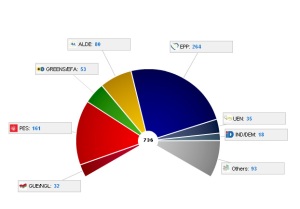
Overall turnout has fallen at each European election in the last 30 years, from a high of nearly 62% in 1979.
Source: BBC [edited] and European Parliament
Centre-right parties have done well in elections to the European Parliament at the expense of the left. Far-right and anti-immigration parties also made gains, as turnout figures plunged to 43% – the lowest since direct elections began 30 years ago.
The UK Labour Party, Germany’s Social Democrats and France’s Socialist Party were heading for historic defeats. The centre-right European People’s Party (EPP) looks set to continue to hold power in the parliament.
Jose Manuel Barroso, who seems set for a second term as European Commission president following the centre-right success, thanked voters and assured them their voices would be heard.
FALLING TURNOUT
1979 – 62%
1984 – 59%
1989 – 58%
1994 – 57%
1999 – 50%
2004 – 45%
2009 – 43%
Greens also made gains – the Green-European Freedom Alliance bloc has so far taken 50 seats, compared with 43 in the last assembly. Sweden’s Pirate Party, which wants to legalise internet file sharing, won 7% of the national vote and one of the country’s 18 seats in the European Parliament. However, governing parties in France and Germany appear to have done relatively well despite the crisis.
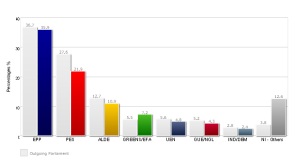
Centre-right parties have done well in elections to the European Parliament at the expense of the left. Far-right and anti-immigration parties also made gains
In results so far:
* French President Nicolas Sarkozy’s UMP trounced socialist opponents, while greens from the Europe-Ecologie party also made gains
* In Italy, Prime Minister Silvio Berlusconi’s centre-right People of Freedom party won most votes – 35% – although that was well below his prediction. The anti-immigrant Northern League made strong gains
* In the UK, the governing Labour Party suffered a serious defeat, gaining its lowest share of the vote for a century
* Spain’s conservative Popular Party beat the ruling Socialists, but the four percentage point margin was lower than they had expected
* Poland’s governing centre-right Civic Platform gained ground at the expense of the Eurosceptic Law and Justice Party
* Portugal’s conservative Social Democrats secured about 31% of the vote. The ruling Socialists fell a massive 18 percentage points from the last European election, to about 26%
* Austria’s far right increased its vote on the last European election but was well down on its percentage in last year’s national polls
* Greece’s Socialist party, PASOK, bucked the European trend by securing the largest vote percentage, ahead of the ruling conservatives
The centre-right EPP retains its place as the largest grouping over the past five years, securing an estimated 264 of the 736 seats (the overall number of seats in the assembly has been reduced from 785). The socialists are on 183, while the liberal ALDE has an estimated 84. Provisional figures released by the EU suggested turnout was at an all-time low in some countries, including France, where it dropped to 40.5%.
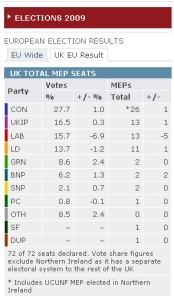
Lowest turnout was seen in Slovakia (19.6%) and Lithuania (20.9%), while the highest figures came from Luxembourg (91%) and and Belgium (85.9%) - both countries where voting is compulsory.
Lowest turnout was seen in Slovakia (19.6%) and Lithuania (20.9%), while the highest figures came from Luxembourg (91%) and and Belgium (85.9%) – both countries where voting is compulsory.
Overall turnout has fallen at each European election in the last 30 years, from a high of nearly 62% in 1979.
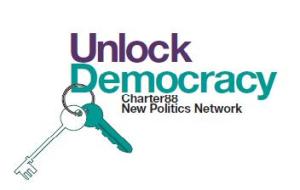
About the author : Emily Robinson is Research and Publications Officer at Unlock Democracy and has previously worked at the New Local Government Network and the Institute for Public Policy Research. Her publications include My Election: A Voters’ Eye View of the 2007 Scottish Elections (with Patrick Casey, Unlock Democracy, forthcoming); General Election 2005: What the Voters Saw (with Justin Fisher, New Politics Network, 2005); Living with Regions: Making Multi-level Governance Work (NLGN, 2004) and The Benefits of Community Engagement (with Ben Rogers, ippr/Home Office, 2004). Emily is also the series editor of New Politics, Unlock Democracy’s regular discussion paper.
Source: UnlockDemocracy.org [edited]
Author: Emily Robinson
British Citizens and the European Union : Findings from a deliberative process
Britain’s relationship with the European Union excites a great deal of emotion. It is a staple of the tabloid press and one of the few political topics that is regularly discussed in pubs and offices. However, this does not necessarily mean that we know much about the EU or how it works.
British citizens are less confident that they know about the EU’s policies and institutions than the people in any other member state, except Hungary. In a Eurobarometer poll conducted in Autumn 2005, only 46% of British respondents were aware of the UK’s Presidency of the EU and MORI research found that 82% of those
polled do not feel they have enough information to make an informed decision on whether or not to adopt the Constitutional Treaty.
Lack of knowledge leaves us vulnerable to misinformation and myth-creation. This is worrying, not only because it leads to frustration and alienation but also because political parties shape their policies on Europe according to what they believe the public will accept. If the public do not have enough information to engage in a serious debate about the future of the European Union and our relationship to it, then it is likely that our policies will be unsound.
This project was designed to gauge informed public opinion on Europe. We wanted to find out what citizens would think when all the information had been presented to them.
…
The [research] highlighted a sense of unease about the way that the European Union is governed. Even the most Europhilic panellists complained about a lack of democracy, transparency and accountability.
The panellists felt very strongly that, as the only directly elected body, the European Parliament should be at the centre of European decision making. It was also suggested that the Commission should be made in some way accountable to the Parliament. Important steps to enhance the transparency and accountability of European procedures could be taken at the national level. For instance, it was suggested that British members of the Council of Ministers should have to report back to Parliament and that the House of Commons Select Committee on Europe should meet in public. We think these are both important proposals, which would place Europe more clearly in our existing democratic framework and create a new layer of accountability.
Another problem identified by many of the panellists was a lack of reliable accessible information about the EU and its activities. This was seen to be partly a problem with the information made available by the European institutions, but also the result of a lack of media interest in the workings of the EU. It was suggested that the broadcast and print media should cover the European Parliament in the same way as Westminster.
Download the full report here: http://www.unlockdemocracy.org.uk/wp-content/uploads/2007/12/british-citizens-and-the-european-union.pdf



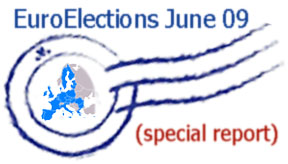
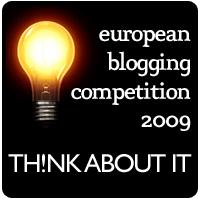


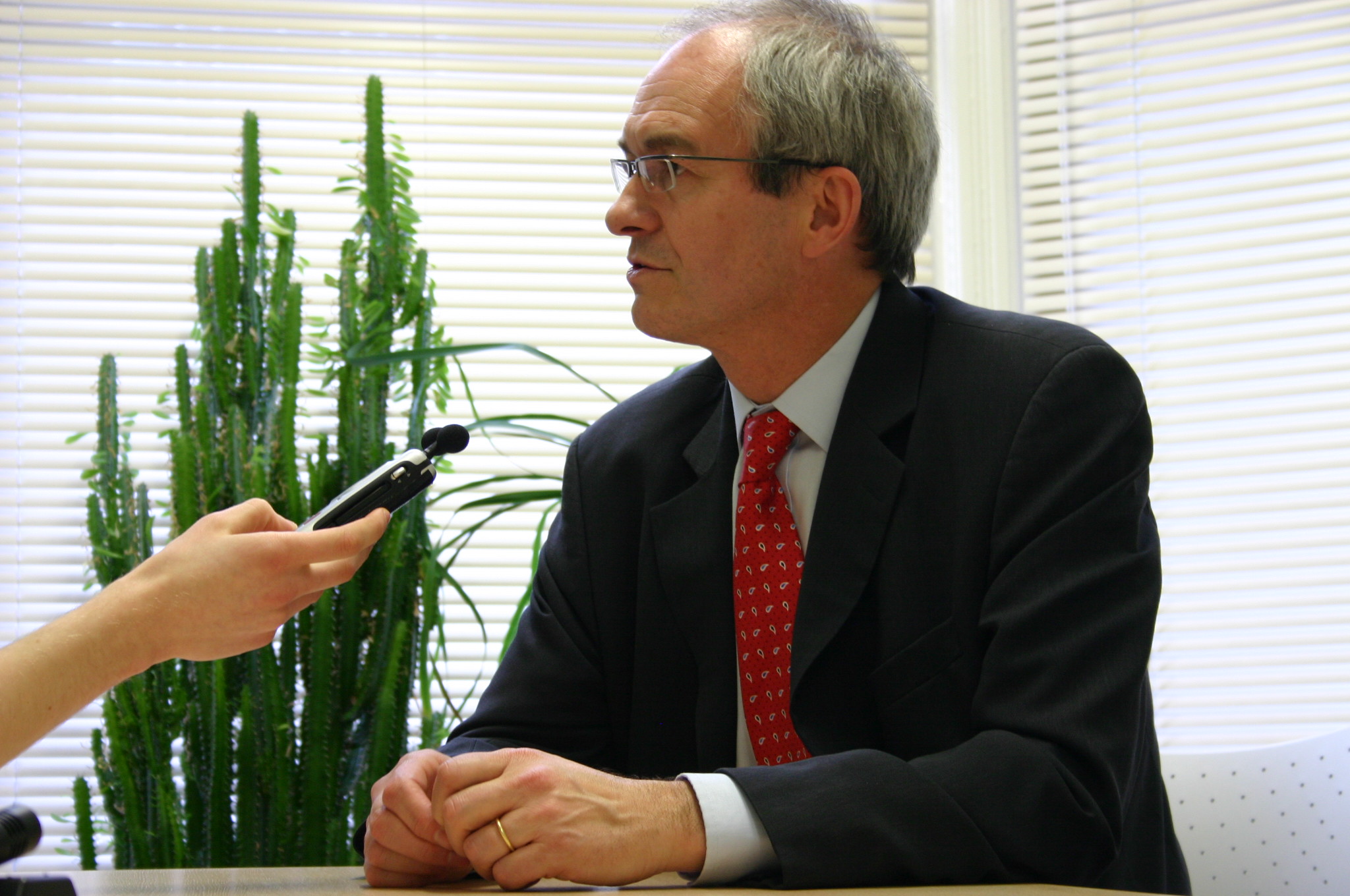
Recent Comments